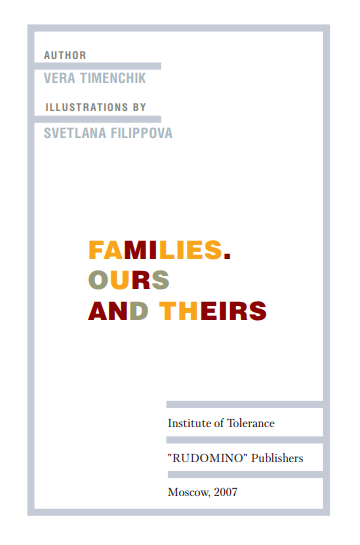Social Issues in Ludmila Ulitskaia’s Children’s Book Series: Family (2)
 Vera Timenchik’s book, Семья у нас и у других (2006) conveys liberal sensibilities and openly discusses questions that until recently were never raised in Russian schools: xenophobia, school bullying, war in the Caucasus, ethnic intolerance, divorce, homosexual marriage, and marital age. Timenchik centers the book’s plot on two 12-year old friends: Kirill is a native Russian born in Moscow; Daut is a recent immigrant from Abkhazia, an area in the Caucasus. Kirill’s family is small and liberal; Daut’s family is, on the contrary, large and patriarchal. Yet, despite their differences, the Kirill and Daut become friends and learn to accept each other’s differences.
Vera Timenchik’s book, Семья у нас и у других (2006) conveys liberal sensibilities and openly discusses questions that until recently were never raised in Russian schools: xenophobia, school bullying, war in the Caucasus, ethnic intolerance, divorce, homosexual marriage, and marital age. Timenchik centers the book’s plot on two 12-year old friends: Kirill is a native Russian born in Moscow; Daut is a recent immigrant from Abkhazia, an area in the Caucasus. Kirill’s family is small and liberal; Daut’s family is, on the contrary, large and patriarchal. Yet, despite their differences, the Kirill and Daut become friends and learn to accept each other’s differences.
Семья у нас и у других challenges the traditional concept of “we” vs. the “other” as she discusses the issue of “normalcy” in marriage practices. From Kirill’s mother, the boys learn that in some European countries, marriage between people of the same sex is legal and that in some liberal democracies, including the US, gay couples can adopt children. This is perhaps the first Russian children’s book in which homosexuality is mentioned at all and in which gays are not treated as the criminal “other.” What is also interesting in this discussion of gay marriage is that Kirill’s mother does not tell the boys what’s right and what’s wrong with sexual practices but rather presents other practices as alternatives.
Timenchik rejects a monological authorial solution of controversial issues, as is usually the case in educational children’s literature, but rather lets her readers know that mainstream culture is not the only one and that there are many marginal or marginalized cultures that should not be suppressed or neglected. Timenchik offers her young readers not answers but choices and makes them think about diversity and ways of dealing with it. The book warns, however, that challenging cultural stereotypes often goes hand-in-hand with struggle or conflict.
Reviewed by Larissa Rudova